IIIT Hyderabad Prof. Avinash Sharma’s work in the 3D computer vision with focus on digital humans has applications in emerging platforms like the Metaverse platform. We look at building blocks, the Vedantic and other philosophies that piques his creative brain and shapes his Reality!
The binding factor for all that Prof. Avinash has achieved, is an overarching personal philosophy that was incubated by early exposure to simple living and high thinking. His association with IIIT Hyderabad has been a long and cherished one; first as an MS by Research student and in recent years as Assistant Professor at the Institute’s Centre for Visual Information Technology (CVIT). The researcher completed his PhD in Applied Mathematics from INP Grenoble and INRIA Rhone-Alpes and began his post-doctoral work at Max Planck Saarbrucken but chose to return to India early due to personal commitments.
Building futuristic Virtual Fitting Rooms for digital human avatars
“Along with my mainstream courses in computer graphics, digital image processing and computer vision, we are also running an interesting advanced course, focused on tele-immersive virtual and augmented/ mixed reality applications”, explains the professor. He currently has several internal collaborations in robotics, cognitive sciences and GIS domain. His team is also involved in highly relevant and impactful applied research with industry collaborations with MNCs like Cyient, TCS research and Walmart (Myntra).
Born out of the syncretic vision of the center is a startup venture in the emerging metaverse platform, “where our research team are digitizing Indian and Oriental clothing and have applied for US patents”, he informs. It allows customers to visualize how 3D clothing fits their avatar, by virtually “trying on” clothing. Virtual try-on technology is poised to be a big business opportunity and their app promises to be revolutionary.
IIITH will soon be releasing a first of its kind, 3D human body data set for Indian population, funded by a government grant, that can scan high quality geometry and appearance of the body structure. “This will allow us to democratize this domain and create more opportunities for academic groups to do research in this realm”, believes the professor. One exciting project that is being supported by the Government of India is on Heritage Preservation by way of capturing and preserving the Indian classical dance forms. The AI driven tool can guide the viewer to appreciate the subtler nuances of the dance form.
A Round trip to IIITH with a layover at Rhone-Alpes
Prof. Avinash completed his Bachelor from IET, Devi Ahilya Vishwavidyalaya, Indore with a reasonably good project for that level of exposure, that prompted his IIITH interview panel of pre-eminent academics to encourage him to take up research. “I initially opted for M.Tech but soon realized that there was interesting research happening in IIITH and was hooked”, he comments. With Dr. Anoop Namboodiri’s guidance, he would participate in an Intel student research challenge, the outcome of which was a CV solution for hand gesture detection that got him selected for a workshop with Intel, Bangalore. “I spent almost a semester with my seniors in the robotics group while I migrated from M. Tech to the MS program” says the researcher. “I was lucky to have the guidance of stalwarts like Prof. P J Narayanan, Prof. Jawahar, Prof. Madhava Krishna and Prof. Anoop Namboodiri during my journey as an MS student; that helped me publish at top conferences like ECCV as part of my thesis work and secured PhD admission at INRIA, a top French research Institute in the field of automation”.
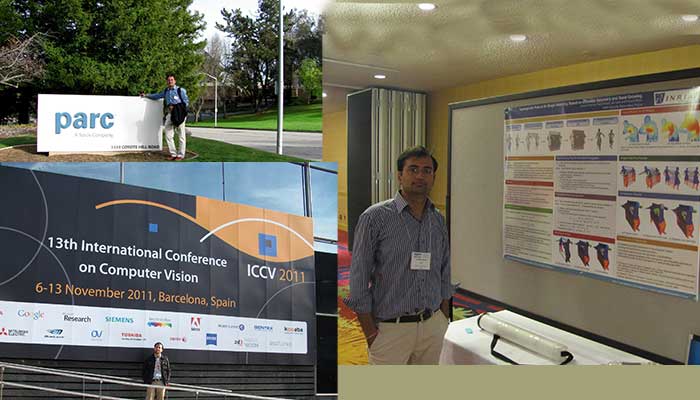
INRIA and circling back to IIITH
Prof. Avinash Sharma’s stint at INRIA (2008-12) was to be a highly satisfactory tenure, working on 3D computer vision field with applications to human body reconstruction and analysis, under the supervision of Prof. Radu Horaud and Prof. Edmond Boyer. “Apart from academic rigor, I also thoroughly enjoyed a lot of mountain activity around Grenoble, surrounded by the magnificent Alpine ranges. In particular, I enjoyed amateur skiing, weekend trips for trekking and rock climbing including an arduous hike and overnight stay on an Alpine glacier”, says the teetotaler and vegetarian who travelled across Europe in his spare time. “I would like to particularly acknowledge my friend Visesh Chari for sharing my journey through PhD as lab-mate and roommate.”
Upon his return to India, he had a two-year stint as Research Scientist at Xerox Research Center India (2013-15), working on graph-based modeling of various business domains and co-authored multiple patents and publications. His research interests lie in 3D Human Body Reconstruction, 3D Point Cloud Generation and Analysis, Spectral Graph Analytics, Brain Graph Analytics and Graph SLAM in Robotics.
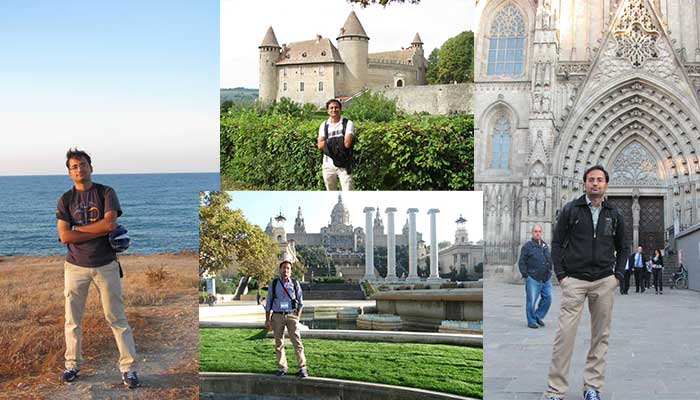
Steam engines and thermodynamics that sparked joy
“I see myself as a product of my parents upbringing and the schooling that I had in the initial years at Vidyabharati school in Indore”, observes Prof. Avinash whose mother majored in Biology and Chemistry and father in Mathematics. “I have travelled in steam engines with my grandfather and because of him, I was interested in understanding its dynamics. But the credit for the scientific exposure goes to my mother who taught thermodynamics”. The young scholar would leaf through her books, that were lying at home and actually got to witness it working in the real world. As a child, he sought to understand how things work and would take up innovative projects even if it involved taking some risks; whether it was trying to build the piston of a steam engine for a science exhibition or getting electrocuted with a hundred-watt bulb while attempting to make a movie projector.
His schooling helped him to look beyond technical excellence and truly embrace the important things in life. “I guess that’s the reason why both my wife (an M. Tech from IIT Delhi) and I have seen the value of sacrifice, when it comes to prioritizing personal commitments to family. Whatever I have achieved is thanks to my mother who is largely responsible for shaping my goals and my father for living an idealistic and value based life. My wife has shown a phenomenally strong character while going through hardship of life and constantly supported me in my career pursuit”, he notes.
Prof. Avinash was deeply inspired by the ecosystem of technical excellence, harmony and human values that IIITH Director Prof. Sanghal had built into the Institute’s DNA. The professor credits Prof. Kannan Srinathan for encouraging him to get into research. He says, “During my student days, one particular memory that stands out is the Yuktahar Mess, a student driven mess that was Prof. Sanghal’s vision that I was a part of and is still successfully running today. Along with responsibilities that come with my position in a residential campus, I have been a part of the Mess committee and Campus Life Council, curating activities to instill human values”. He is a program committee member for several international conferences and has over 30 publications in computer vision, robotics and brain analytics domain like ICCV, ECCV, CVPR, IROS, NeuroImage and IGRASS conferences. Apart from the UAC fellowship from Xerox foundation, among his accomplishments, he cherishes the Qualcomm fellowship received by his student.
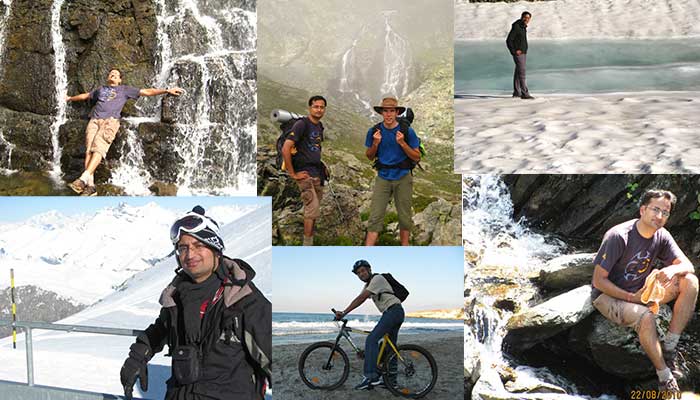
Exploration into a philosophical dimension
“I like to delve into the philosophical understanding of life, and am thankful for growing up in a tolerant Indic cultural ethos that allows me the freedom to question practically everything in the universe”, says the daily philosopher. “As a matter of fact, my Postdoc interview at Max Planck was on the concept of Maya that is closely relates to virtual reality”.
Everything is related, believes Prof Avinash. “We have traditional rituals passed down generations through family and community, but translating it into life requires a good interpreter. I have a spiritual guide who is guiding me through the crises and celebrations in life. When my wife and I went through a difficult phase and lost our child, he was there for us, along with my family especially my brother and sister-in-law and the entire IIITH community who were pillars of strength for us during this trying period”. Maintaining a sustainable work-life balance is very tricky for the researcher, who is trying to juggle a structured work schedule with spending family time with his wife Mamta and son Devansh.
“We are trying to establish a collaboration with a yoga university in Bangalore that is doing active research in the domain,” says the professor who recently completed a basic course in yoga and meditation. I enjoy participating in the tree plantation and cleaning drives on campus and am a frequent visitor to a small farm that the Institute maintains. I love celebrating that sustainable ecosystem with its gray water recycling, organic gardens and fruit trees that attract birds and animals”.
“Research gives me joy. I always tell my students to Localize themselves. Right from a top researcher to a hermit in a Himalayan cave, all have the same existential question – Who am I, Where am I and Why am I here? The answer lies within, in what I believe is our own journey inward, according to the Vedanta. I love interacting with the universe and its manifestation are in the form of my family, friends and my students. Anything new that I explore or learn, about people and psyche, travelling and see new things in nature, motivates me and keeps me alive as a researcher”, sums up Prof. Avinash Sharma.
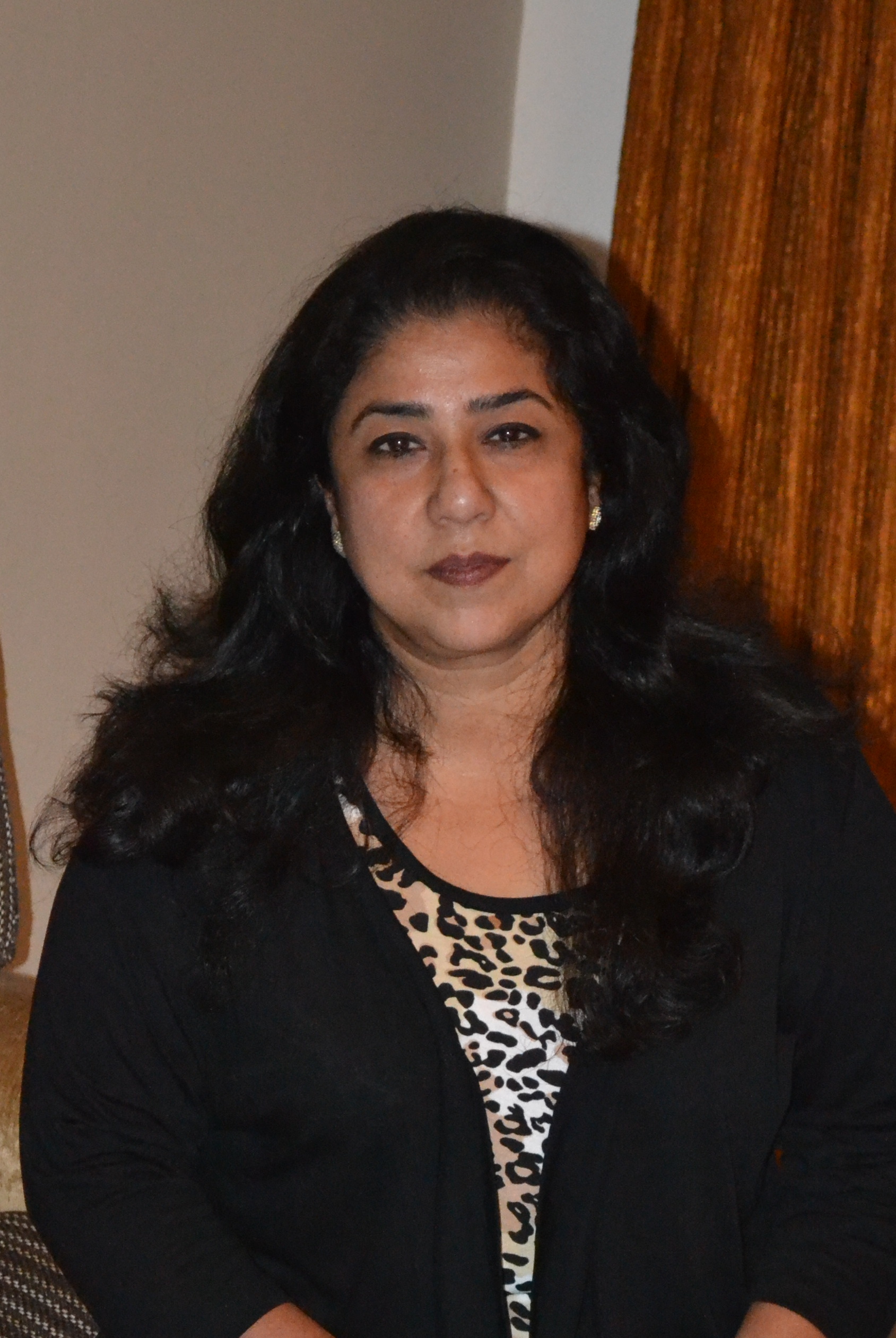

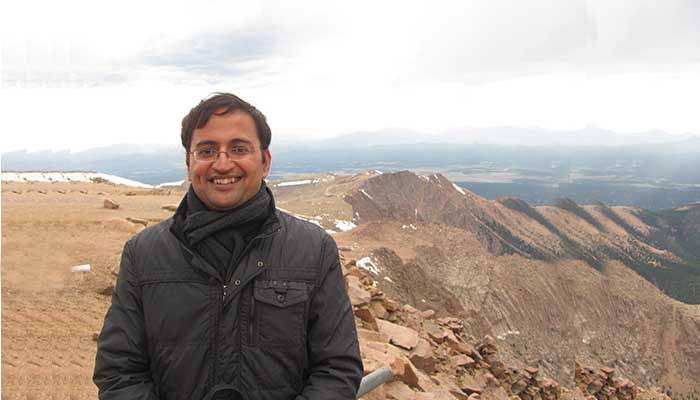
Excellent!!! 👏👌🙏
Jyothi Punhani Chopra says: